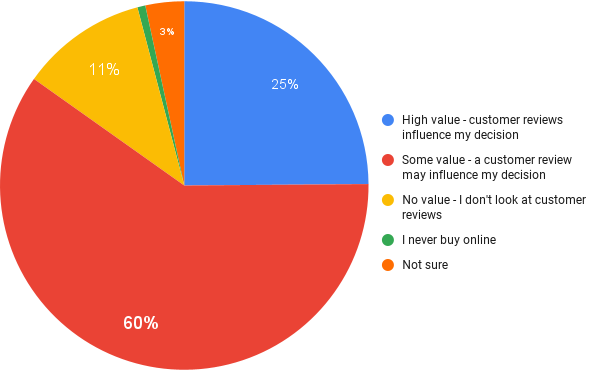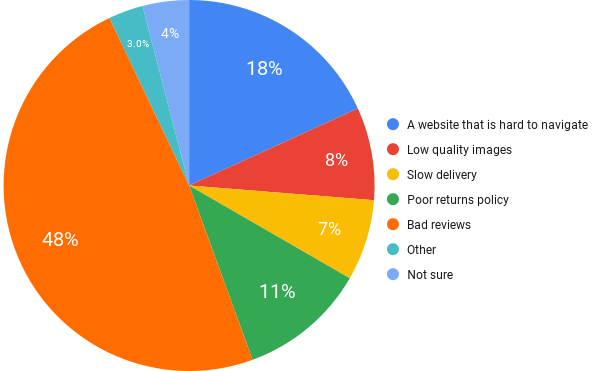
In a recent survey, we discovered 85% of Brits place value in online reviews.[1] After several years of economic uncertainty, consumers need the reassurance of other customers’ opinions before parting with their money on a brand’s product or service.
However, recent data by the UK government found that 15% of online reviews could be fake, prompting the launch of a new act of parliament that will focus on banning these unscrupulous tactics as well as tackling scam subscription traps which could be costing consumers £1.6 billion a year.
Fake review detection site TruthEngine® reveals that the problem could be even worse than the government data suggests, with their research finding that at least a third of reviews are not genuine. They predict that by the end of next year 50% of reviews will be fake.
How can customers place value in a review when such a large majority are not real? We are here to share just how damaging a fake review can be, and what you can do instead to gain real, positive reviews.
The DMCC Act
In the 2022 Queen’s speech, the British government announced the Digital Markets, Competition and Consumers Bill (The DMCC Act). From summer 2024, it will be illegal for a brand to create fake reviews and for review platforms to host them. The new rules in the DMCC Act will allow the Competition and Markets Authority (CMA) to enforce consumer protection laws directly, rather than having to take individual cases to court. Businesses that cannot prove their reviews are genuine may risk a fine of up to 10% of global turnover.
Daniel Mohacek, CEO at TruthEngine, says: “We expect to see increased publicity from Which? and the CMA, which will highlight to the consumer that it’s actually quite unusual that your local village hairdresser has many thousands of glowing five star reviews. The new normal will be a smaller number of authenticated reviews which more accurately and honestly reflect the product or service supplied to the consumer.”
How can you spot a fake review?
Clusters of reviews arriving moments apart, written in a similar way, all talking about the same attributes of a product are all signs of a fake review, TruthEngine CEO reveals. Mohacek also states that the total number of reviews is usually a good first sign – when a brand has a sky-high review count and thousands of glowing reviews arriving every day, it is highly unlikely these are genuine.
Aside from the legal aspect, brands will be creating impossibly high expectations when there is a large number of positive reviews. A review score of 4.9/5 may persuade your customer to buy, but they will only be left disappointed if their experience does not match the thousands of 5 star reviews. This creates more negative reviews, which fuels the need to fake more positive reviews, resulting in a vicious cycle.
Bad reviews voted number 1 factor to stop a sale
Trust in a brand is becoming a necessity when it comes to customers choosing where to place their sale. Transparency needs to be the focus, and reviews play a big role in the credibility of a brand.
As we mentioned earlier, a huge 85% of survey respondents agree that customer reviews influence their decision, often the deciding factor on whether they purchase or not. Only a small percentage of survey respondents (0.7%) said they never buy online, demonstrating how your digital presence should be a priority now more than ever. As we can see, online reviews are a big part of this presence, with most people putting their trust in past customers’ opinions.

We also discovered that a third (30%) of women place high value in reviews, compared to 20% of men. If the majority of your audience are women, you most likely need to showcase your glowing (real) reviews in order to finalise that sale.
Almost half (48%) of survey respondents said they would be put off buying a product or service with bad reviews. The next reasons for being put off from a product were a website that is hard to navigate (18%), poor returns policy (11%), low quality images (8%), and slow delivery (7%). A poor user experience and bad reviews are ultimately the factors that drive away a sale, reminding us to focus on creating a seamless customer experience for our customers.

Hotels are chosen based on reviews
The post-Covid travel boom has helped the travel industry recover from a time of lockdowns, however travellers are looking for more trustworthy sources after the pandemic. Just like retail businesses, travel companies need to prove why they should be the brand that their target customers buy from.
We learnt almost half (44%) of survey respondents chose a hotel based on reviews.[2] Cost, location, and room standards were voted the highest reasons for choosing a hotel, with reviews also swaying a customer’s decision.
Your guide to gaining glowing reviews
Now we have established how important it is to have credible reviews on your site, and how bad reviews can impact businesses, let’s look into exactly how your brand can generate real, positive reviews.
Improve your customer service
A common issue that may crop up in reviews is poor customer service. There are a myriad ways of improving your communication, such as quickly responding to customers and making the contact details clear on your website. Live chats and social media are great ways of interacting with your audience, and will make the buying journey much easier for them. When a problem inevitably arises, customers will be less likely to leave a negative review when they have received an apology and a quick resolution.
Loyalty schemes
Loyalty schemes are another great way of making your customers a priority. Create special discounts or early access to sales and new items, exclusively for members. This is a win-win strategy, as brands will gain loyalty from their customers and, in turn, customers will feel valued.
Listen to the complaints
Our number one piece of advice would be to analyse your data and hear what your customers are saying. Listen to the negative reviews – what are some recurring complaints? What issues have customers pointed out? If needed, improve your products or services with the customer’s needs at the forefront of your mind.
TruthEngine’s Mohacek says: “Think: ‘Here’s an opportunity for me to run a better business’. Work out if any of your reviews are fake negatives from rivals, get rid of those and your score might even go up. Once you have a corpus of sensible, real, genuine reviews, have a look at what they are saying about you. Fix the problem, if you can, and not only will you end up running a better business, you’ll also be DMCC-compliant at the end of it.”
Read our other guides on ways to keep your customers happy:
- Prioritising Your Customers: The Importance of Customer Service
- How to Beat the Retail Competition in a Post-Covid World
- Understanding Customers: How to Research Your Target Audience
- Lower Holiday Budgets: How to Market Travel in a Time of Crisis
If you have any questions, don’t hesitate to get in touch. If you need help with your digital marketing strategy, send us an email and we can see how we can help.
Data information
[1] This statistic is from a survey we conducted of 2,000 UK residents via YouGov. The survey was run on 7 October 2023 and all responses were selected at random.
[2] This data is from a survey we conducted of 2,000 UK residents via YouGov. The survey was run on 5 August 2023 and all responses were selected at random.

